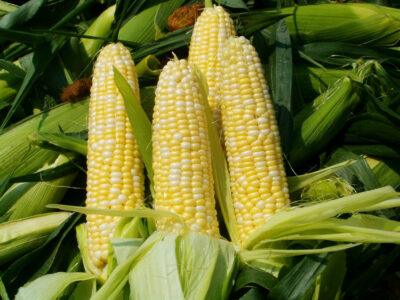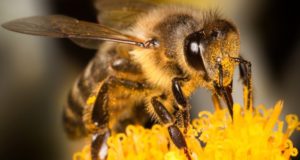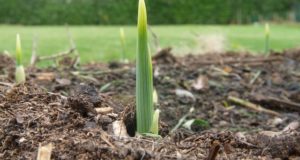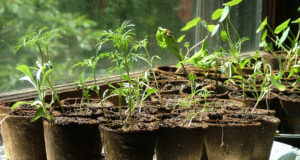Anyone who is striving for self-sufficiency, whether living on a small city lot or on a ranch in the country, needs to have a self-sustaining garden.
This means a garden that flourishes without the need for buying expensive hybrid seeds, synthetic fertilizers or industrial-strength pesticides. These may not exist when society ends as we know it. And frankly, we’re better off without them, relying instead on organic methods used for thousands of years before modern society.
Assuming you’ve built a self-sustaining garden, now it’s time to focus on the crops that bring the most benefit to the homestead. The following factors help choose the best crops.
- Reliability – does the crop consistently yield a good harvest?
- High yield – is the quantity of food produced per unit area high?
- Multiple uses – is there more than one use for the produce or remaining plant?
- Storage – can the harvest be stored long enough to allow use through the winter and early spring?
With these factors in mind, consider these five crops mandatory for the homestead garden.
1. Field Corn
The corn cobs of field corn are allowed to mature on the plant. The result is dry corn kernels that can be ground into flour for bread, tortillas, polenta or mush. Field corn also has multiple uses. First, immature ears can be roasted for fresh corn in the summer. The ears aren’t as sweet as sweet corn, but they are tasty and provide a fresh vegetable. Second, the remaining stalks can be used as supplemental fodder for pigs and cattle. Finally, any leftover stalks can be composted.
Get Delicious, Nutrient-Dense Heirloom Seeds Here!
Whole kernel corn can be stored over winter in a dry, cool space.
2. Beans
Beans are a versatile vegetable high in protein. Choose a variety that can be harvested young for string beans, but also left on the vine to dry for dry beans. That way you can have fresh string beans for eating during the summer, as well as plenty to can.
Dry beans can be stored over winter and used to make rich hearty soups or accompany meat dishes. With more than 1,500 calories per pound, dry beans fill up hardworking homesteaders.
Beans are also advantageous because they replenish nitrogen in the soil, enriching it for crops like corn that need a lot of nitrogen to grow.
Story continues below the video
3. Squash
Squash are easy to grow and have many benefits. Although most squash are classified as summer squash or winter squash, most winter squash can be picked immature and eaten like summer squash. The only ones that don’t work well are small Cucurbita pepo varieties. So with one type of squash, you can have fresh summer squash all summer long, and then harvest the winter squash for use during the winter.
Winter squash has lots of fiber and is high in vitamins A and C. It also produces huge yields, averaging about 75 pounds of fruit per 100 square feet.
It also has the advantage that it can be stored in cold storage along with onions, potatoes, carrots, turnips and other root vegetables. Its heavy flesh can be baked, boiled and mashed, or turned into soup.
Extra squash makes great fodder at any stage of development, so the plant can also produce supplemental feed for your animals for several months.
New Natural Fertilizer Doubles Garden Production!
4. Potatoes
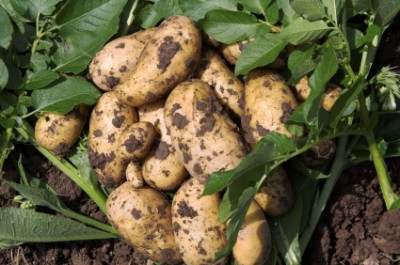 Potatoes have undeservedly gained a bad reputation over the last few years, derided because they have a lot of starch and carbohydrates. That may be true, but the real problem is the American diet, not the potato. If the potato is the only major source of carbohydrates for a meal, then there’s no issue. However, if you already have several sources of carbohydrates at a meal, then no, you shouldn’t add a potato. For example, think about a typical summer meal: grilled steak, macaroni salad (lots of carbs), rolls (lots of carbs), a beer or soft drink (too many carbs), and you’re already eating too many carbohydrates. Add a baked potato or French Fries, and you’re at more than 200 carbohydrates — an irresponsible and excessive amount.
Potatoes have undeservedly gained a bad reputation over the last few years, derided because they have a lot of starch and carbohydrates. That may be true, but the real problem is the American diet, not the potato. If the potato is the only major source of carbohydrates for a meal, then there’s no issue. However, if you already have several sources of carbohydrates at a meal, then no, you shouldn’t add a potato. For example, think about a typical summer meal: grilled steak, macaroni salad (lots of carbs), rolls (lots of carbs), a beer or soft drink (too many carbs), and you’re already eating too many carbohydrates. Add a baked potato or French Fries, and you’re at more than 200 carbohydrates — an irresponsible and excessive amount.
But when society ends as we know it, we will need carbohydrates to complement the protein from meat. We’ll return to a society that doesn’t have enough to eat, rather than our current society where the paradoxical problem is too much to eat.
So grow potatoes, which give you the most calories per square foot of planting. They can be baked, boiled, mashed or fried to complement your protein source. Equally beneficial is the fact that they can be stored over winter, and provide a steady source of food during the winter and early months of spring.
5. Cabbage
Cabbage may seem like a strange choice, but it has many positive attributes that should make it a staple in your garden.
First, cabbage has cold-hardiness. It can stay unharvested in the garden until late fall, and then be stored in cold storage over the winter. Second, cabbage can be used for fresh coleslaw in late summer and early fall. Then it can be fermented into sauerkraut, a food with many vitamins that is a great side dish for meat in the winter.
Cabbage may also have some health benefits, which will be sorely needed when society ends as we know it and modern medicine is gone. Potential benefits are cancer prevention, soothing stomach ulcers, and anti-inflammatory properties.
Cabbage is also fodder. Dark green or purple varieties of cabbage can supplement the diet of your chickens or rabbits.
There are a lot of great fruits and vegetables to grow on the homestead. However, those that do double or triple duty are the most valuable – and the ones we should prioritize.
Which fruits or vegetables would you add to this list? Share your suggestions in the section below:
Are You Using Heirloom Seeds This Year? Read 8 Reasons Why You Should.
 Off The Grid News Better Ideas For Off The Grid Living
Off The Grid News Better Ideas For Off The Grid Living

